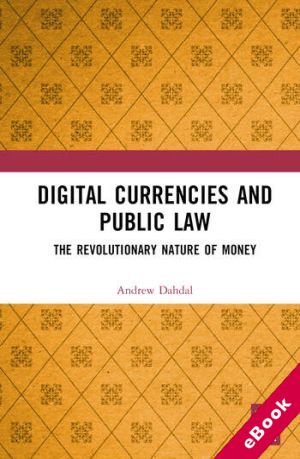
The device(s) you use to access the eBook content must be authorized with an Adobe ID before you download the product otherwise it will fail to register correctly.
For further information see https://www.wildy.com/ebook-formats
Once the order is confirmed an automated e-mail will be sent to you to allow you to download the eBook.
All eBooks are supplied firm sale and cannot be returned. If you believe there is a fault with your eBook then contact us on ebooks@wildy.com and we will help in resolving the issue. This does not affect your statutory rights.
This book supports the deeper engagement of public lawyers in digital currency developments which threaten dramatic changes in the relationship between individuals and government authorities.
No contemporary issue is more widely acknowledged and less understood than that of digital currencies. The voice of constitutional scholars, however, is crucially missing from prevailing digital money discourses. Private law scholars are grappling with the legal questions raised by digital currency models in property and contract. Public law scholars, by contrast, have yet to appreciate the significance of the moment. The challenge of understanding the technical dimensions of digital money innovations has obscured the potential constitutional revolution digital currencies represent. This book proceeds from the proposition that ‘money’ is best conceived as a constitutional phenomenon. When seen as such, it becomes clear that changes in the nature of money represent changes in political and constitutional arrangements. Explaining how, and in what ways, those changes will take place is the primary focus of this book. Through an examination of historical episodes where the nature of money has been linked to renewed constitutional settlements, this book distils a core set of principles linking aspects of monetary innovation such as technical control of the money supply to constitutional positions such as executive fiscal accountability. From these principles, a conceptual framework is proposed that translates the specific attributes of digital currency proposals into the language of constitutional dynamics.
The book will be of interest to students, academics and practitioners with an interest in the law of digital currencies, constitutional law and politics.